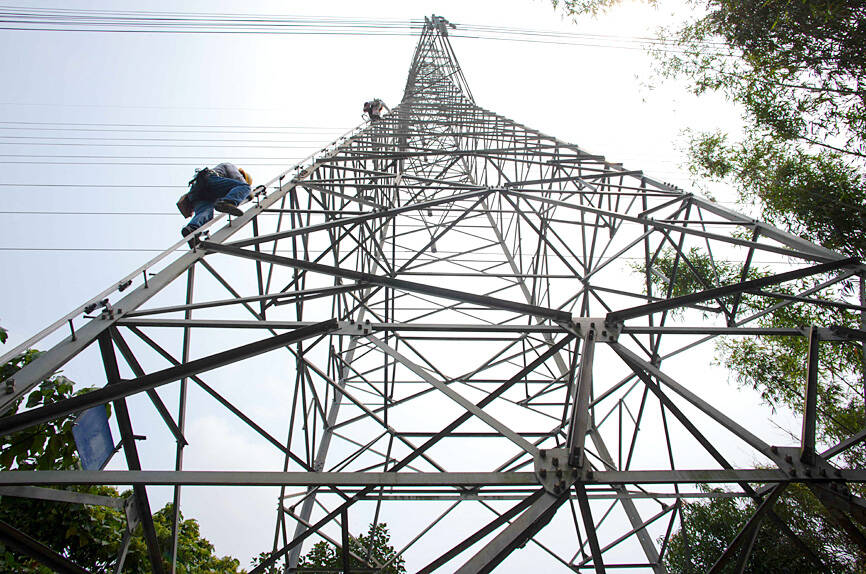Major trade groups yesterday called on incoming economics and finance ministers to prioritize ensuring stable electricity supply and power rates to make Taiwan a business-friendly nation.
The Third Wednesday Club and the Chinese National Association of Industry and Commerce (CNAIC, 工商協進會) made the remarks after premier-designate Cho Jung-tai (卓榮泰) on Tuesday revealed his choice of Topco Group (崇越集團) chairman J.W. Kuo (郭智輝) as minister of economic affairs.
Cho also appointed insurance professor Peng Jin-lung (彭金隆) to steer the Financial Supervisory Commission, former PricewaterhouseCoopers Business Consulting Services Taiwan chairman Paul Liu (劉鏡清) as minister of the National Development Council and academic Wu Cheng-wen (吳誠文) as minister of the National Science and Technology Council.

Photo: Sam Yeh, AFP
“We’re glad to see entrepreneurs and academics in the new administration and look forward to their contributions to Taiwan’s economic development,” said Lin Por-fong (林伯豐), chairman of the Third Wednesday Club, whose membership is limited to the top 100 firms in individual sectors.
Lin said he hopes president-elect William Lai (賴清德) would halt electricity rate adjustments after he assumes office on May 20 so that businesses can breathe a sigh of relief following an 11 percent increase in rates on average this month.
The government should strive for GDP growth of more than 3.5 percent this year, better than the 3.2 percent uptick for the global economy projected by the IMF, Lin said.
The most urgent task for the government is to ensure that electricity supply is stable and affordable, Lin said.
Two unexpected blackouts on Tuesday afternoon hit about 10,000 households in Taoyuan and New Taipei City, following a power capacity strain on Monday.
The April 3 earthquake affected a power plant in Hualien County and the rise in temperatures put pressure on overall power supply, Taiwan Power Co (台電) said.
Lin said the government should revisit the nation’s energy mix by ditching the plan to phase out nuclear power plants and raising the share of nuclear power to 30 percent from about 10 percent.
Artificial intelligence services and applications require data centers, high-capacity servers and high-performance computing chips, all of which consume large amounts of electricity, he said.
The government could extend the services of Guosheng Nuclear Power Plant in Wanli District (萬里), New Taipei City, and Ma-anshan Nuclear Power Plant, in Ma-anshan (馬鞍山), Pingtung County, and build new ones with top-class safety standards, he added.
Pegatron Corp (和碩) chairman Tung Tzu-hsien (童子賢) told an economic forum that nations with computing power advantages and sufficient electricity capacity would emerge victorious in the AI era.
CNAIC chairman Thomas Wu (吳東亮) applauded the incoming Cabinet’s emphasis on technology and financial innovations among other things.
Ministers-designate should talk with trade groups to gain better understanding of their needs and views, Wu said.
Most sectors have called for relaxed labor rules and imports of foreign workers to solve human resources shortages, he said.
Only two of the 15 new appointments in Cho’s Cabinet are female and the CNAIC would like to see more female ministers for the sake of gender equality, he added.
More than 20 Cabinet posts are still to be named.

Taiwan Semiconductor Manufacturing Co (TSMC, 台積電) last week recorded an increase in the number of shareholders to the highest in almost eight months, despite its share price falling 3.38 percent from the previous week, Taiwan Stock Exchange data released on Saturday showed. As of Friday, TSMC had 1.88 million shareholders, the most since the week of April 25 and an increase of 31,870 from the previous week, the data showed. The number of shareholders jumped despite a drop of NT$50 (US$1.59), or 3.38 percent, in TSMC’s share price from a week earlier to NT$1,430, as investors took profits from their earlier gains

In a high-security Shenzhen laboratory, Chinese scientists have built what Washington has spent years trying to prevent: a prototype of a machine capable of producing the cutting-edge semiconductor chips that power artificial intelligence (AI), smartphones and weapons central to Western military dominance, Reuters has learned. Completed early this year and undergoing testing, the prototype fills nearly an entire factory floor. It was built by a team of former engineers from Dutch semiconductor giant ASML who reverse-engineered the company’s extreme ultraviolet lithography (EUV) machines, according to two people with knowledge of the project. EUV machines sit at the heart of a technological Cold

Taiwan’s long-term economic competitiveness will hinge not only on national champions like Taiwan Semiconductor Manufacturing Co. (TSMC, 台積電) but also on the widespread adoption of artificial intelligence (AI) and other emerging technologies, a US-based scholar has said. At a lecture in Taipei on Tuesday, Jeffrey Ding, assistant professor of political science at the George Washington University and author of "Technology and the Rise of Great Powers," argued that historical experience shows that general-purpose technologies (GPTs) — such as electricity, computers and now AI — shape long-term economic advantages through their diffusion across the broader economy. "What really matters is not who pioneers

TAIWAN VALUE CHAIN: Foxtron is to fully own Luxgen following the transaction and it plans to launch a new electric model, the Foxtron Bria, in Taiwan next year Yulon Motor Co (裕隆汽車) yesterday said that its board of directors approved the disposal of its electric vehicle (EV) unit, Luxgen Motor Co (納智捷汽車), to Foxtron Vehicle Technologies Co (鴻華先進) for NT$787.6 million (US$24.98 million). Foxtron, a half-half joint venture between Yulon affiliate Hua-Chuang Automobile Information Technical Center Co (華創車電) and Hon Hai Precision Industry Co (鴻海精密), expects to wrap up the deal in the first quarter of next year. Foxtron would fully own Luxgen following the transaction, including five car distributing companies, outlets and all employees. The deal is subject to the approval of the Fair Trade Commission, Foxtron said. “Foxtron will be